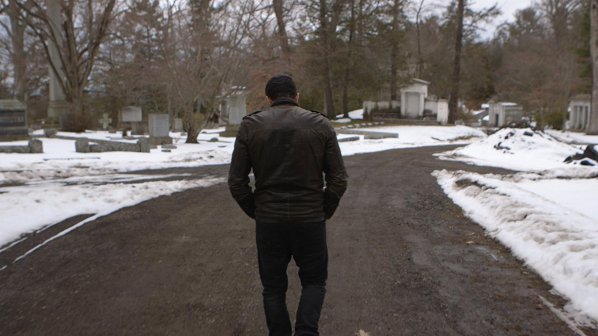Title: Funny Cow
MPAA Rating: R
Director: Adrian Shergold
Starring: Maxine Peake, Stephen Graham, Paddy Considine, Tony Pitts
Runtime: 1 Hour 42 Minutes
What It Is: Director Adrian Shergold’s film is a fictionalized story of a nameless female comedian (known only as the “funny cow”) who rises from an impoverished childhood to a thriving career. Played by Maxine Peake, the funny cow has several things that have set her back on the road to fame; a bullied childhood where she realized she wasn’t normal, a physically abusive partner, an alcoholic mother, and the general misogyny of the era that meant women were only ever given attention at comedy shows if they stripped naked. It’s a rag to riches biopic of a comedian who never really existed, and yet the film follows all the expected beats.
What We Think: The idea behind the film promises much but it’s frustrating to see it squandered. Behind the scenes, there’s a lot of drama in comedy: the strange difference between what’s funny and what isn’t, the strain between the desire for self-expression and the need to keep the crowd on side. But Shergold and Pitts never get around to exploring any of these themes.. Comedy, here, is little more than a ploy: the focal point is the heroine’s search for a vocation, not on her subsequent experiences in showbiz.
Among the problems never really tackled is the fact that to contemporary ears most of the stand-up material we hear is miserably dated and unfunny. When Lenny’s stale gags fall flat, his answer is to throw the switch to racism; when his protege takes his place, she borrows this trick, among others. Shergold and Pitts pointedly raise this as an issue, but make no effort to think it through: there’s no indication of how racist impulses manifest elsewhere in this setting, or how far the heroine might share in them herself.
A great deal about this feels more suitable for the theatre than to the cinema: despite the glum tone, the approach is the reverse of realism. The dingy interiors are shot with a wide-angle lens that makes them look like the sets they are, and symbolic devices are forced on the story rather than arising naturally from it.
This means that on a literal level, much of what we’re shown is simply unbelievable. To exhibit that she’s a life force, the heroine is always dressed in red, even as a little girl at her father’s funeral. Her onstage repartee isn’t the kind of “respectable” British entertainer of the 1970s would be likely to get away with (blue material, yes, but not a barrage of four-letter words.
Our Grade: C-, This film is certainly not without its charms but it was arty in the wrong ways and often bizarrely misjudged I felt. The tonal balance felt slightly off with the overall depressive nature of the story only leavened by some time-period-appropriate off-color and groan-worthy gags.


